
Jozef Gašpar Tiso was a Slovak politician and Roman Catholic priest who served as president of the Slovak Republic, a client state of Nazi Germany during World War II, from 1939 to 1945. In 1947, after the war, he was executed for war crimes and crimes against humanity in Bratislava.

Yehuda Bauer is an Israeli historian and scholar of the Holocaust. He is a professor of Holocaust Studies at the Avraham Harman Institute of Contemporary Jewry at the Hebrew University of Jerusalem.
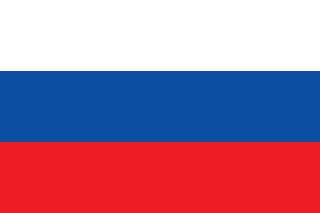
The (First) Slovak Republic, otherwise known as the Slovak State, was a partially-recognized client state of Nazi Germany which existed between 14 March 1939 and 7 May 1945. The Slovak part of Czechoslovakia declared independence with German support one day before the German occupation of Bohemia and Moravia. The Slovak Republic controlled the majority of the territory of present-day Slovakia but without its current southern parts, which were ceded by Czechoslovakia to Hungary in 1938. It was the first time in history that Slovakia had been a formally independent state.
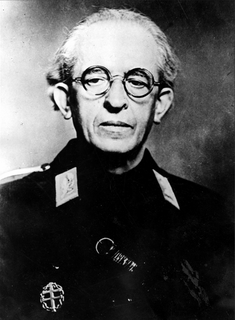
Vojtech Lázar "Béla" Tuka was a Slovak politician who served as prime minister and minister of Foreign Affairs of the First Slovak Republic between 1939 and 1945. Tuka was one of the main forces behind the deportation of Slovak Jews to Nazi concentration camps in German occupied Poland. He was the leader of the radical wing of the Slovak People's Party.

The history of the Jews during World War II is almost synonymous with the persecution and murder of Jews which was committed on an unprecedented scale in Europe and European North Africa. The massive scale of the Holocaust which happened during World War II greatly affected the Jewish people and world public opinion, which only understood the dimensions of the Final Solution after the war. The genocide, known as HaShoah in Hebrew, aimed at the elimination of the Jewish people on the European continent. It was a broadly organized operation led by Nazi Germany, in which approximately six million Jews were murdered methodically and with horrifying cruelty. Although the Holocaust was organized by the highest levels of the Nazi German government, the vast majority of Jews murdered were not German, but were instead residents of countries invaded by the Nazis after 1938. Of the approximately 6 million Jews murdered by the Nazis, approximately 160,000 to 180,000 were German Jews. During the Holocaust in occupied Poland, more than one million Jews were murdered in gas chambers of the Auschwitz concentration camp alone. The murder of the Jews of Europe affected Jewish communities in Albania, Austria, Belarus, Belgium, Bosnia & Herzegovina, Channel Islands, Croatia, Czech Republic, Estonia, France, Germany, Greece, Hungary, Italy, Latvia, Libya, Lithuania, Luxembourg, Moldova, the Netherlands, North Macedonia, Norway, Poland, Romania, Russia, Serbia, Slovakia, and Ukraine.

Hitler's Willing Executioners: Ordinary Germans and the Holocaust is a 1996 book by American writer Daniel Goldhagen, in which he argues that the vast majority of ordinary Germans were "willing executioners" in the Holocaust because of a unique and virulent "eliminationist antisemitism" in German political culture which had developed in the preceding centuries. Goldhagen argues that eliminationist antisemitism was the cornerstone of German national identity, was unique to Germany, and because of it ordinary German conscripts killed Jews willingly. Goldhagen asserts that this mentality grew out of medieval attitudes rooted in religion and was later secularized.

The history of the Jews in Slovakia goes back to the 11th century, when the first Jews settled in the area.

The Holocaust, also known as the Shoah, was the genocide of European Jews during World War II. Between 1941 and 1945, Nazi Germany and its collaborators systematically murdered some six million Jews across German-occupied Europe; around two-thirds of Europe's Jewish population. The murders were carried out in pogroms and mass shootings; by a policy of extermination through labor in concentration camps; and in gas chambers and gas vans in German extermination camps, chiefly Auschwitz-Birkenau, Bełżec, Chełmno, Majdanek, Sobibór, and Treblinka in occupied Poland.

Responsibility for the Holocaust is the subject of an ongoing historical debate that has spanned several decades. The debate about the origins of the Holocaust is known as functionalism versus intentionalism. Intentionalists such as Lucy Dawidowicz argue that Adolf Hitler planned the extermination of the Jewish people as early as 1918, and personally oversaw its execution. However, functionalists such as Raul Hilberg argue that the extermination plans evolved in stages, as a result of initiatives that were taken by bureaucrats in response to other policy failures. To a large degree, the debate has been settled by acknowledgement of both centralized planning and decentralized attitudes and choices.

Goodbye Holland is a 2004 documentary about the extermination of Dutch Jews during World War II. The film debunks the accepted notion that the Dutch were 'good' during the war, exposing how Dutch police and civil servants helped the Nazis implement massive deportations, which resulted in the death of 78 percent of the Jews in the Netherlands.
Antisemitism —prejudice, hatred of, or discrimination against Jews— has experienced a long history of expression since the days of ancient civilizations, with most of it having originated in the Christian and pre-Christian civilizations of Europe.
The Topoľčany pogrom was an antisemitic riot in Topoľčany, Slovakia, on 24 September 1945 and the best-known incident of postwar violence against Jews in Slovakia. The underlying cause was resurgent antisemitism directed at Jewish Holocaust survivors who demanded the return of property that had been stolen during the Holocaust. Rumors spread that a local Catholic school would be nationalized and the nuns who taught there replaced by Jewish teachers.
During World War II, Slovakia was a client state of Nazi Germany and a member of the Axis powers. It participated in the war against the Soviet Union and deported most of its Jewish population.
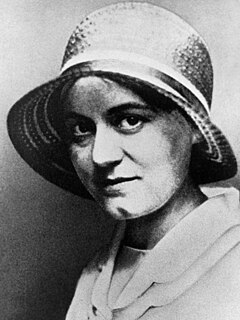
Several Catholic countries and populations fell under Nazi domination during the period of the Second World War (1939–1945), and ordinary Catholics fought on both sides of the conflict. Despite efforts to protect its rights within Germany under a 1933 Reichskonkordat treaty, the Church in Germany had faced persecution in the years since Adolf Hitler had seized power, and Pope Pius XI accused the Nazi government of sowing 'fundamental hostility to Christ and his Church'. The concordat has been described by some as giving moral legitimacy to the Nazi regime soon after Hitler had acquired quasi-dictatorial powers through the Enabling Act of 1933, an Act itself facilitated through the support of the Catholic Centre Party. Pius XII became Pope on the eve of war and lobbied world leaders to prevent the outbreak of conflict. His first encyclical, Summi Pontificatus, called the invasion of Poland an "hour of darkness". He affirmed the policy of Vatican neutrality, but maintained links to the German Resistance. Despite being the only world leader to publicly and specifically denounce Nazi crimes against Jews in his 1942 Christmas Address, controversy surrounding his apparent reluctance to speak frequently and in even more explicit terms about Nazi crimes continues. He used diplomacy to aid war victims, lobbied for peace, shared intelligence with the Allies, and employed Vatican Radio and other media to speak out against atrocities like race murders. In Mystici corporis Christi (1943) he denounced the murder of the handicapped. A denunciation from German bishops of the murder of the "innocent and defenceless", including "people of a foreign race or descent", followed.
During the Holocaust, the Catholic Church played a role in the rescue of hundreds of thousands of Jews from being murdered by the Nazis. Members of the Church, through lobbying of Axis officials, provision of false documents, and the hiding of people in monasteries, convents, schools, among families and the institutions of the Vatican itself, saved hundreds of thousands of Jews. The Israeli diplomat and historian Pinchas Lapide estimated the figure at between 700,000 and 860,000, although the figure is contested.

The Kingdom of Italy was governed by the National Fascist Party from 1922 to 1943 with Benito Mussolini as prime minister. The Italian Fascists imposed authoritarian rule and crushed political and intellectual opposition, while promoting economic modernization, traditional social values and a rapprochement with the Roman Catholic Church. According to Payne (1996), "[the] Fascist government passed through several relatively distinct phases". The first phase (1922–1925) was nominally a continuation of the parliamentary system, albeit with a "legally-organized executive dictatorship". The second phase (1925–1929) was "the construction of the Fascist dictatorship proper". The third phase (1929–1934) was with less interventionism in foreign policy. The fourth phase (1935–1940) was characterized by an aggressive foreign policy: the Second Italo-Ethiopian War, which was launched from Eritrea and Somaliland; confrontations with the League of Nations, leading to sanctions; growing economic autarky; invasion of Albania; and the signing of the Pact of Steel. The fifth phase (1940–1943) was World War II itself which ended in military defeat, while the sixth and final phase (1943–1945) was the rump Salò Government under German control.

The Holocaust in Slovakia was the systematic dispossession, deportation, and murder of Jews in the Slovak State, a client state of Nazi Germany, during World War II. Out of 89,000 Jews in the country in 1940, an estimated 69,000 were murdered in the Holocaust.

In August 1942, Jozef Tiso, president of the Slovak State and a Catholic priest, gave a speech in Holič, Slovakia, in which he defended the deportation of Jews from Slovakia. Referring to Jews as "parasites" and "the eternal enemy", Tiso claimed that their deportation was both economically necessary and congruent with Christian moral principles. The speech has been recognized as a key part of Tiso's moral legacy, emblematic of his complicity in the Holocaust.
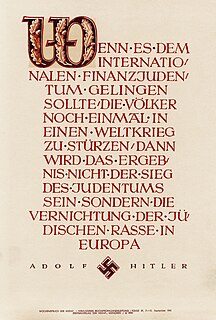
During a speech at the Reichstag on 30 January 1939, Adolf Hitler threatened "the annihilation of the Jewish race in Europe" in the event of war:
If international finance Jewry inside and outside Europe should succeed in plunging the nations once more into a world war, the result will be not the Bolshevization of the earth and thereby the victory of Jewry, but the annihilation of the Jewish race in Europe.
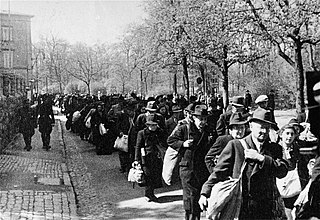
The question of how much Germans and other Europeans knew about the Holocaust while it was ongoing continues to be debated by historians. With regards to Nazi Germany, some historians argue that it was an open secret amongst the population whilst others highlight a possibility that the German population were genuinely unaware of the Final Solution. Peter Longerich argues that the Holocaust was an "open secret" by early 1943, but some authors place it even earlier. However, after the war, many Germans claimed that they were ignorant of the crimes perpetrated by the Nazi regime, often using the stereotypical phrase "davon haben wir nichts gewusst".

















